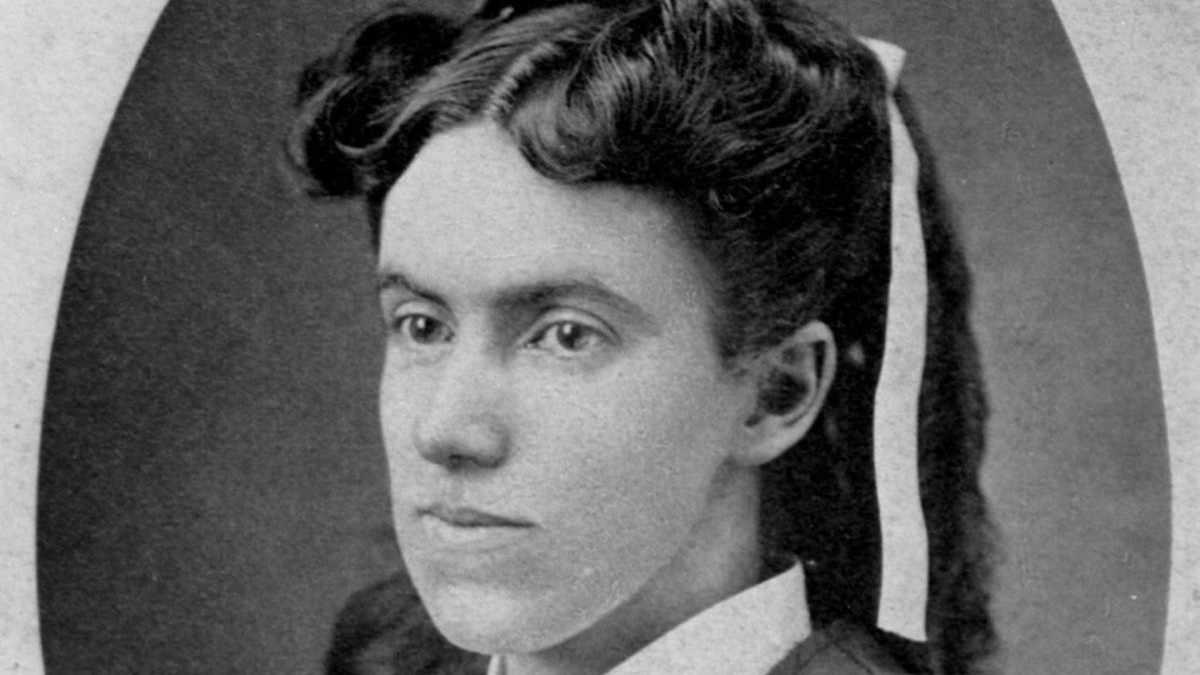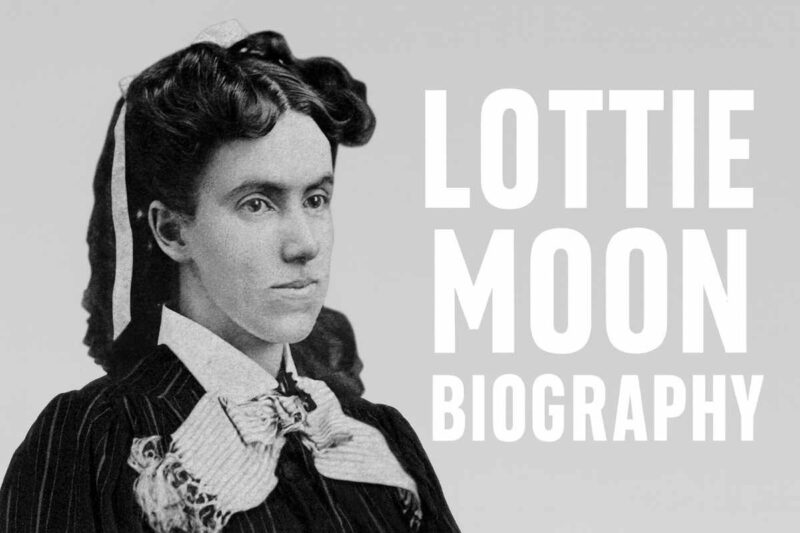Charlotte Digges “Lottie Moon (December 12, 1840 – December 24, 1912) was an American Southern Baptist missionary to China with the Foreign Mission Board who lived and worked in China for over four decades (1873-1912). As a teacher and evangelist, she established a history of strong support for missions among Southern Baptists, particularly through the Woman’s Missionary Union.
Lottie Moon Biography


Moon was born to affluent, devout Baptist parents, Anna Maria Barclay and Edward Harris Moon. She grew up on the family’s historic tobacco estate, Viewmont, which covered 1,500 acres (6.1 km²) near Scottsville, Virginia. Lottie was the fourth child in a family with five girls and two boys. Lottie was 13 when her father died in a riverboat accident.
The Moon family prioritised education, and Lottie began attending the Baptist-affiliated Virginia Female Seminary (later Hollins University) and the Albemarle Female Institute in Charlottesville, Virginia, when she was 14. Moon was one of the first women to get a Master of Arts degree from a southern college in 1861. She studied Latin, Greek, French, and Italian. Later, she would become an expert in Chinese.
Career
Lottie, a vibrant and talkative child, was unconcerned about her Christian upbringing until her early teens. She experienced a spiritual awakening after attending a series of revival meetings on the college campus. In 1858, Moon experienced an awakening at a revival meeting led by John Broadus, one of the founders of the Southern Baptist Theological Seminary. [Citation needed]
Although educated women in the mid-nineteenth century had few employment options, her older sister Orianna became a surgeon. She served as a Confederate Army doctor during the American Civil War. During the war, Lottie assisted her mother in maintaining the family estate, after which she began a teaching career.
She taught in female academies, beginning in Danville, Kentucky. In Cartersville, Georgia, Moon and her friend, Anna Safford, opened Cartersville Female High School in 1871. Moon also joined the First Baptist Church and served the destitute families in Bartow County, Georgia.
To the family’s amazement, Lottie’s younger sister Edmonia accepted a call to be the first single woman Baptist missionary in northern China in 1872. By this point, the Southern Baptist Convention had loosened its policy on sending unmarried women to the mission field, and Lottie felt compelled to accompany her sister to China. On July 7, 1873, the Foreign Mission Board formally appointed 32-year-old Lottie as a missionary in China.
Lottie joined her sister Edmonia at the North China Mission Station at the treaty port of Dengzhou, Shandong, where she began her ministry by teaching in a boys’ school. Moon discovered her enthusiasm for direct evangelism while joining some of the more experienced missionary women on “country visits” to remote areas.
At the time, married men did the majority of mission work, but the wives of China missionaries Tarleton Perry Crawford and Landrum Holmes uncovered a crucial fact: only women could approach Chinese women.
Moon retired from teaching in 1885, at the age of 45, and travelled to the interior to evangelise full-time in P’ingtu and Hwangshien. Her converts number in the hundreds. Moon went on a much-needed furlough in the United States in 1892 and again in 1902. She was deeply concerned that her fellow missionaries were burning out from a lack of rest and refreshment and that they were dying young.
Back home, the mindset was, “Go to the mission field, die on the mission field.” Many people did not expect to see their friends and family again. Moon contended that regular furloughs every ten years would extend the lives and usefulness of experienced missionaries.
Throughout her missionary career, Moon encountered plague, hunger, upheaval, and warfare. The First Sino-Japanese War (1894), the Boxer Rebellion (1900), and the Chinese Nationalist revolt (which deposed the Qing Dynasty in 1911) all had a significant impact on missionary work. Famine and sickness also claimed their victims.
When Moon returned from her second furlough in 1904, she was deeply moved by the plight of those who were literally starving to death around her. She appealed for more money and resources, but the mission board was deeply in debt and could not send anything.
Salaries at the mission were slashed willingly. Moon, unbeknownst to her fellow missionaries, shared her personal resources and food with anyone in need, which hurt both her physical and mental health. In 1912, she weighed just 50 pounds.
Alarmed, her fellow missionaries arranged for her to return home to the United States with a missionary companion. Moon died en route, at the age of 72, on December 24, 1912, at the harbour of Kobe, Japan. Her corpse was cremated, and the remains were delivered to her family in Crewe, Virginia, for burial.
Lottie Moon Books
Here are some quotations from Lottie Moon’s letters:
- “Why should we not… do something that will prove that we are really in earnest in claiming to be followers of him who, though he was rich, for our sake became poor?”
- “A young man should consider not if it is his duty to visit the heathen, but whether he dares to stay at home. The command is simple: ‘Go.’”
- “Please inform the incoming missionaries that they are entering a life of struggle, responsibility, and relentless self-denial. They’ll need to be tough and courageous. If the Lord’s pleasure is their strength, the blessings of the task will far outweigh the difficulties. Let them come’rejoicing to suffer for the sake of our Lord and Master, who willingly gave his life for them.”
Personal Life
Moon’s association with Crawford Howell Toy, a contentious figure among Southern Baptists in the late 1800s, was rumoured to be amorous in nature. Moon and Toy originally met at the Albemarle Female Institute. Under Toy’s supervision, Lottie studied Hebrew and English grammar after previously learning Latin, Greek, French, Italian, and Spanish, and went on to become one of the first women to acquire a master’s degree in languages.
While some argue that Toy proposed to Moon before the Civil War, her description of a marriage proposal from Toy dates from 1881. In the meantime, Toy backed the Confederacy and became a professor of Old Testament studies at the Southern Baptist Theological Seminary, while Moon helped her mother on their Virginia estate.
Toy resigned from Southern in 1879, citing Darwinism disagreements and his critique of some Baptists’ Christological Old Testament readings. Moon’s 1881 letter to FMB secretary H. A. Tupper reveals her preparations for a spring wedding with Toy, who was then teaching Old Testament and theology at Harvard University. However, the engagement was broken, and their marriage never took place, citing obscure religious reasons.
Toy’s controversial new Bible ideas, as well as Moon’s commitment to continue undertaking Southern Baptist mission work in China, appear to be connected. Toy eventually left Southern Baptists and became a Unitarian.








